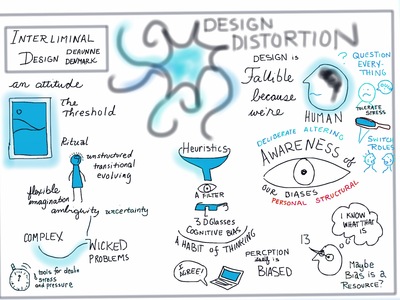Interliminal design: Mitigating cognitive bias and design distortion
Denmark, Deaunne, Harker, Donald and McCollough, Andrew (2013) Interliminal design: Mitigating cognitive bias and design distortion. In: Relating Systems Thinking and Design 2013 Symposium Proceedings, 9-11 Oct 2013, Oslo, Norway.
Preview |
Text
McCollough_Inter_2013.pdf Download (641kB) | Preview |
Preview |
Text
Denmark_Slides_2013.pdf Download (1MB) | Preview |
![Denmark_MindMap_2013.jpg [thumbnail of Denmark_MindMap_2013.jpg]](https://openresearch.ocadu.ca/2160/3.hassmallThumbnailVersion/Denmark_MindMap_2013.jpg)  Preview |
Image
Denmark_MindMap_2013.jpg Download (531kB) | Preview |
Abstract
The presence of cognitive biases and heuristics induces design distortions, unintended mismatches between desired and actual design outcomes. Interliminal Design is an intentional, adaptive and imaginative design process that mitigates design distortions. The process involves intentional and agile maneuvering between various personal cognitive and structural systems, thereby overcoming negative impacts of cognitive biases and heuristics.Cognitive heuristics are mental shortcuts adapted to enable rapid interpretation of the complex environment in which we evolved and live. These heuristics are inherent in human cognition and resist modification. When applied outside the appropriate context, these heuristics often give rise to systematic errors in human reasoning. Cognitive biases are the result of the context-inappropriate application of cognitive heuristics. Unfortunately, cognitive bias in design thinking often goes unnoticed and unaddressed, resulting in all degrees of design distortion that often affect multiple dimensions of an issue.Design distortions induced by cognitive biases are most apparent in failures to address complex, wicked and super wicked problems. These problems are characterized by incomplete, changing, intricately interdependent, yet contradictory, requirements. They frequently have short timelines, no central authority, and are caused by the same entities charged with solving them using existing irrational policies. We propose a design methodology, emerging at the Collaborative Design program at Pacific Northwest College of Art, to specifically mitigate the contributing factor of irrationality to design. The authors developed and taught an MFA course called Design Thinking and Cognitive Biases to explore the influence of cognitive biases on design and formulate techniques to raise awareness and reduce design distortion induced by cognitive biases.
Interliminal Design recognizes design thinking as an ecosystem comprised of evolving individuals in conscious and subconscious relationships with each other where learning, emergence and adaptation are frequent and nonlinear. Individuals in collaborative design groups working on various dimensions of the design process must effortfully mitigate biases on a personal level. In addition, group-level biases must also be addressed. Counter-intuitively, individuals in groups do not “average out” their biases; instead, biases common across individuals, as well as group dynamics, can result in the strengthening of design biases that further distort the design process and outcomes. Thus, the collaborative group as a whole must also work to mitigate bias.
| Item Type: | Conference/Workshop Item (Paper) |
|---|---|
| Divisions: | Faculty of Design |
| Date Deposited: | 30 Jan 2018 15:22 |
| Last Modified: | 20 Dec 2021 18:33 |
| URI: | https://openresearch.ocadu.ca/id/eprint/2160 |
Actions (login required)
 |
Edit View |

 Lists
Lists Lists
Lists